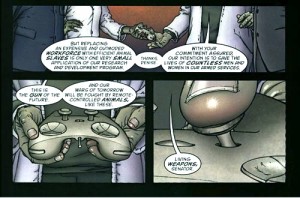I am weakening. This is the last time I’m going to call him. I am going to let him see what I’ve become. Maybe he’ll decide to answer if he sees that the flesh he once experienced, once denied, is finally and definably grotesque and inhuman. Maybe he’ll tell me how much he regrets everything, that he’s sorry, that he loved me.
They’ve made me as comfortable as possible, thankfully I was in no physical pain. The gel pad upon which I laid conformed to my gnarled body with it’s twists, spurs, and knots of my skeleton. Is this me? The emotional pain is unbareable- it is me.
Yet I can barely recognize myself anymore. My neck looks disjointed. It hangs low and cocked to the side in a calcified droop. My main perspective consists of staring at my knotted, knuckled claw that was once my beautiful, slender, and useful right hand. I have stony bone bumps covering my arms and shoulders turning my muscles, tendons and ligaments span my body in ribbons and sheets of a second skeleton.
Moving my body only makes my disease work better, faster, and stronger. Any movement I make becomes petrified into place. My ligaments, tendons, and muscles turn into bone around my joints. I am stuck in this prison, this horrible, awful body diseased with Golem. Cyg was right, the real is ugly. I want him to see me, see my ugliness, see that he was right about bodies now, but not before. I don’t want him to hate me, he actually meant something to me.
I snapped back from my wallowing. “Nurse,” I croaked into my shoulder, “I’m ready to make that video call.”
The line hummed through the traveling to where Cyg was sitting on the other side. Anticipation got the best of me when the video connected, yet I heard nothing. “Cyg,” I slurred. “Know you’re there.”
I wasn’t really sure if he was. I wanted to believe it so badly. If only I could’ve looked at him, looked up to see him staring back at me in sympathy and sorrow. Perhaps he was staring at me right now in bewilderment.
“Guess I know why you’re not answ’ring. I’ll try’nt – try not to take it pers’n’lly.”
Was he there? Listening? I had to keep pretending.
“Want t’say, don’t feel bad. I know y’re just – ‘s’ not your fault, I guess. You’d pick up if you could.”
I needed him to be there- here, for me.
“Just keep trying t’connect, y’know. Can’t help m’self…”
This is the only time I can ever talk to him again. Why won’t he just respond? It’s eating at me just as badly as this disease.
“Please? Jus’ talk to my, Cyg…”
I let silence lapse, let the moment set in. Maybe if I begged a little more.
“Siri, I…just…”
More silence. He wasn’t there. If he was, he truly was the empty person I left. How bone crushing.
“Forget’t.” I said and finally disconnected. Tears streamed down my face. That was the last attempt I could ever make to talk to my one real love.
(293-4)
I chose the scene with Chelsea dying for multiple reasons. Firstly, because what we have from Chelsea are solely remembered accounts from Siri. We never meet CHelsea as a character in the book, she is already dead and we simply hear about her. I wanted to resurrect this image of Chelsea. I wanted to give her more personality than the negative things that Siri recalls of her accusations, desperations, and demonstrations. However, to keep things realistic, I tried to keep that tone of desperation consistent in her feelings towards Siri. In the original text, Siri lays out the scene of her call as an observer. I wanted to give this scene death scene life, and to give Chelsea life.


